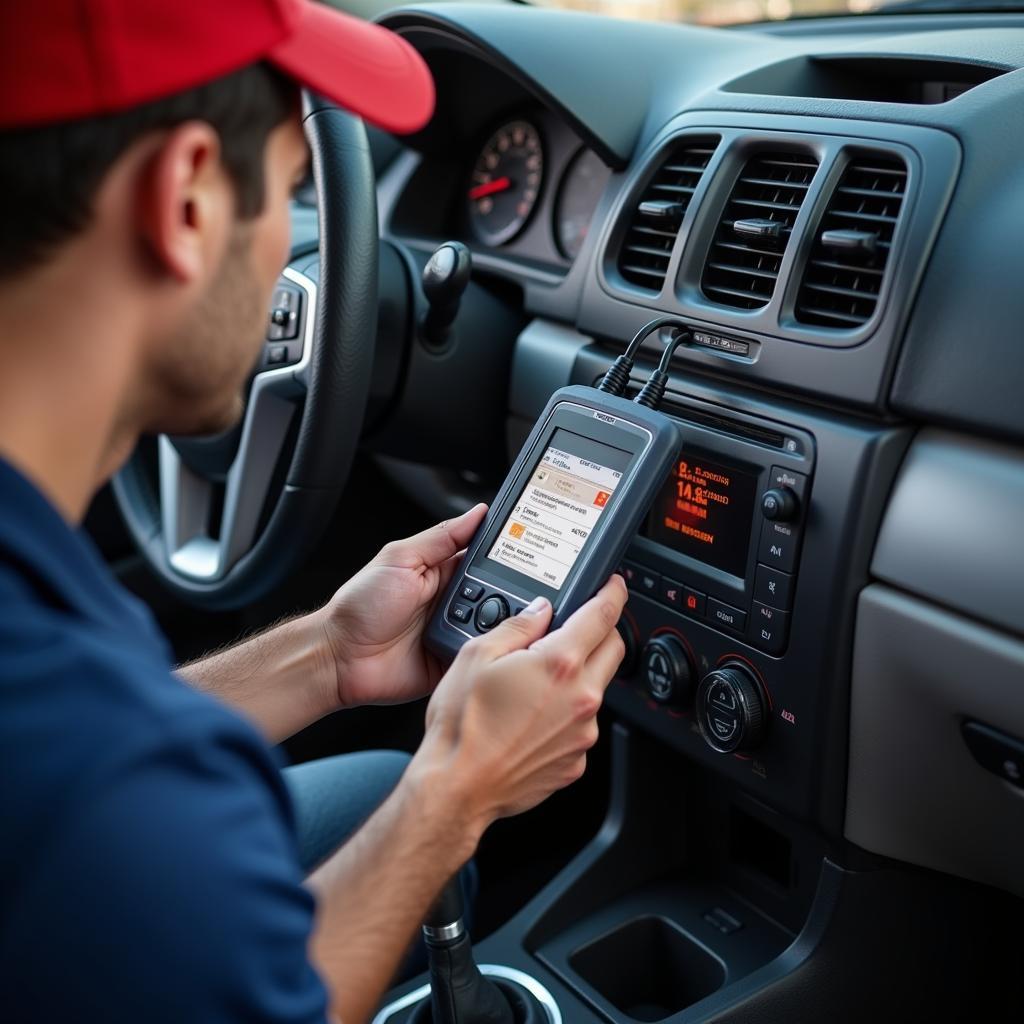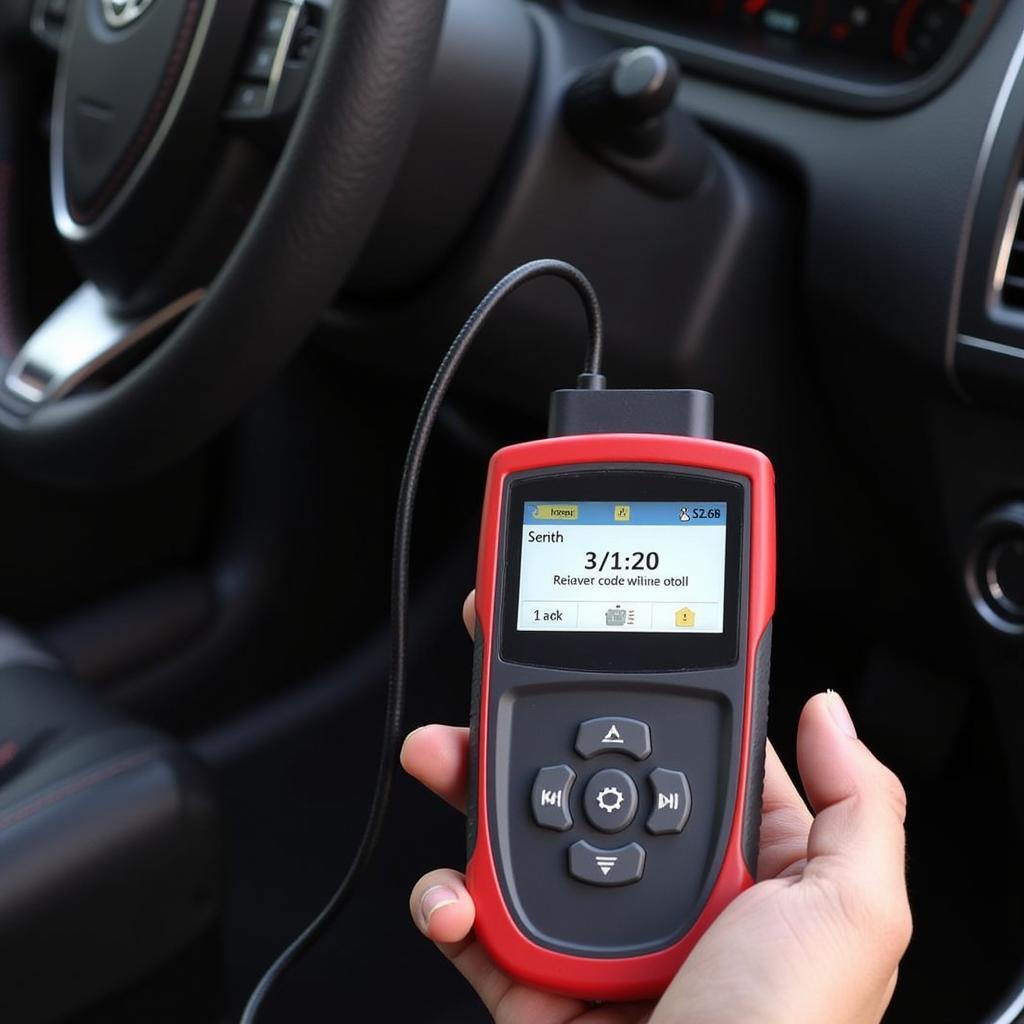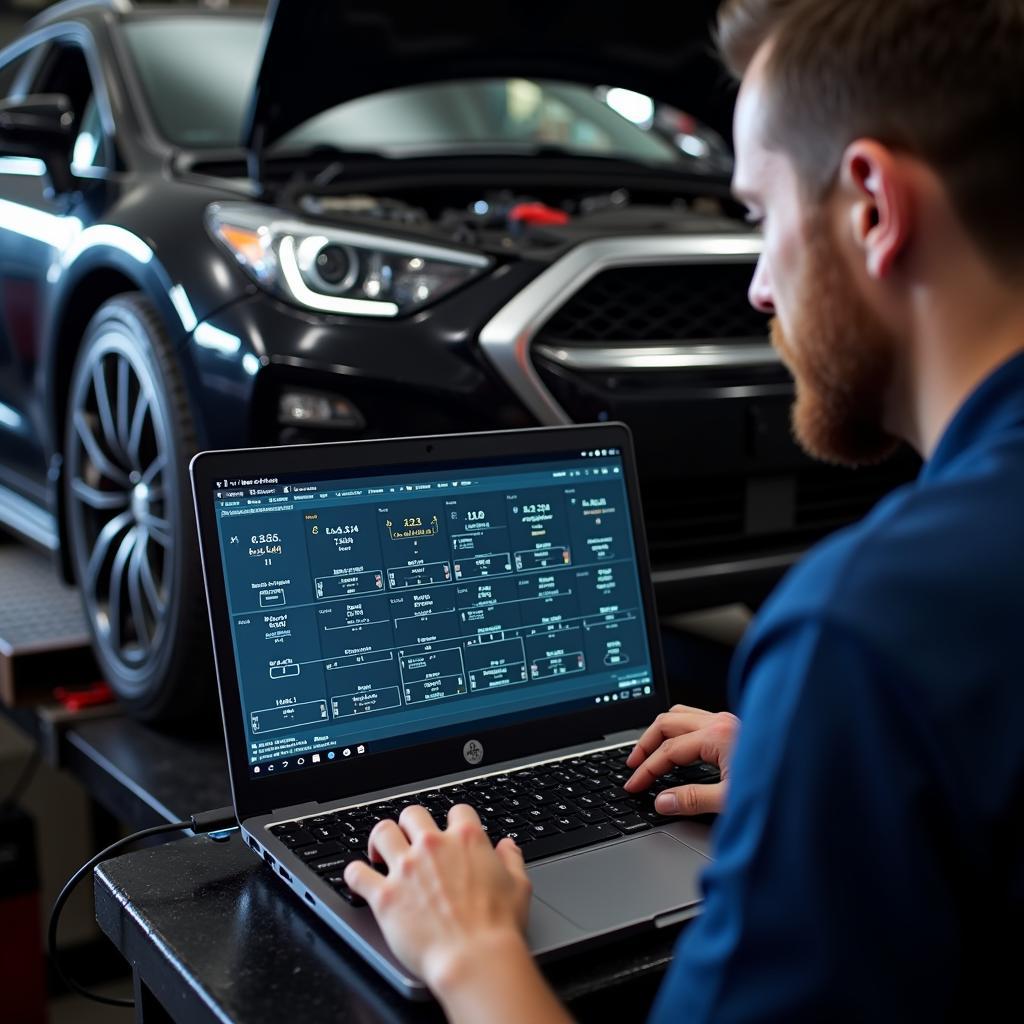Modern vehicles are complex machines that rely on a network of electronic systems to function correctly. When problems arise, pinpointing the cause can be challenging without the right tools. This is where diagnostic tools for cars come into play, providing mechanics and car enthusiasts alike with the ability to read error codes, analyze live data, and troubleshoot issues effectively.
Understanding the Importance of Diagnostic Tools for Cars
 Mechanic Using a Car Diagnostic Tool
Mechanic Using a Car Diagnostic Tool
Diagnostic tools act as a window into the inner workings of your car’s computer system, translating complex data into understandable information. They allow you to:
- Retrieve and interpret Diagnostic Trouble Codes (DTCs): When your car’s computer detects a malfunction, it logs a DTC. Diagnostic tools retrieve these codes, providing valuable clues about the nature and location of the problem.
- Monitor live data streams: These tools allow you to view real-time information from various sensors throughout your vehicle, such as engine RPM, coolant temperature, and oxygen sensor readings. This data helps identify performance issues and intermittent problems.
- Perform component activations: Certain diagnostic tools can activate specific vehicle components, such as fuel injectors or solenoids, to test their functionality and diagnose problems.
- Program and reconfigure modules: In some cases, you can use diagnostic tools to program new modules, update software, or adjust specific vehicle settings.
Types of Diagnostic Tools for Cars
The market offers a wide range of car diagnostic tools, each with varying levels of functionality and price points. Some common types include:
1. Code Readers
As the name suggests, code readers primarily focus on retrieving and displaying DTCs. They are simple, affordable tools ideal for DIY enthusiasts who want to understand why their check engine light is on.
2. OBD-II Scanners
 OBD-II Scanner Displaying Error Code
OBD-II Scanner Displaying Error Code
OBD-II scanners offer more advanced functionality compared to code readers. They can read and clear DTCs, display live data streams, and provide additional information about the error codes, such as freeze frame data.
3. Professional Diagnostic Scanners
Professional-grade scanners are comprehensive tools used by mechanics and automotive technicians. They offer advanced functionalities like bi-directional control, module programming, and access to manufacturer-specific data.
Choosing the Right Diagnostic Tool for Your Needs
Selecting the appropriate diagnostic tool depends on your budget, technical expertise, and intended use.
- DIY Enthusiasts: A diagnostic test tool for cars or a basic OBD-II scanner would be sufficient for occasional troubleshooting and maintenance.
- Home Mechanics: An advanced OBD-II scanner with live data capabilities and some bi-directional control functions would be more suitable.
- Professional Mechanics: Professional-grade diagnostic scanners are essential for comprehensive diagnostics, module programming, and complex repairs.
Benefits of Using Diagnostic Tools for Cars
 Mechanic Analyzing Diagnostic Data on a Laptop
Mechanic Analyzing Diagnostic Data on a Laptop
Utilizing diagnostic tools in car maintenance and repair offers several benefits:
- Accurate Diagnosis: These tools provide precise information about the problem, eliminating guesswork and potentially unnecessary repairs.
- Cost Savings: By accurately identifying the issue, you can avoid replacing parts unnecessarily, saving both time and money.
- Improved Vehicle Performance: Diagnostic tools can help identify and address performance issues, leading to improved fuel efficiency, smoother running, and optimal engine performance.
- Preventative Maintenance: Regular use of diagnostic tools can detect minor issues before they escalate into major problems, preventing costly repairs and downtime.
Conclusion
Diagnostic tools have become indispensable for anyone involved in car maintenance and repair. Whether you’re a DIY enthusiast or a seasoned mechanic, having the right diagnostic tool can save you time, money, and frustration. By understanding the different types of tools available and their functionalities, you can choose the one that best suits your needs and take control of your car’s health. For a comprehensive selection of diagnostic tools and insightful reviews, visit DiagFixPro, your trusted source for automotive diagnostics.
FAQs
What is the OBD-II port and where can I find it?
The OBD-II port is a standardized 16-pin connector found in most cars manufactured after 1996. It is typically located under the dashboard on the driver’s side.
Can I use any diagnostic tool for my car?
Not all diagnostic tools are compatible with all car makes and models. It’s essential to choose a tool compatible with your vehicle’s make, model, and year.
What is the difference between generic and manufacturer-specific codes?
Generic codes apply to all OBD-II compliant vehicles, while manufacturer-specific codes are unique to a particular car make.
Do I need a professional to use a car diagnostic tool?
While professional-grade tools require specialized knowledge, many user-friendly options are available for DIY enthusiasts and home mechanics.
Can diagnostic tools clear the check engine light?
Yes, most diagnostic tools can clear DTCs and turn off the check engine light once the issue has been resolved.
What are some popular diagnostic tools for classic cars?
For owners of classic cars, diagnostic equipment for classic cars often involves specialized tools that are compatible with older engine management systems.
Are there car diagnostic tools that connect to laptops?
Yes, there are various options available for car bluetooth diagnostics software for laptop connections, offering advanced features and data analysis capabilities.
Need help with car diagnostics? Contact our team of experts via WhatsApp: +1(641)206-8880, or Email: [email protected]. We offer 24/7 support to assist you with all your car diagnostic needs. For more information on specific diagnostic tools and techniques, browse our website for additional articles and resources.

Leave a Reply